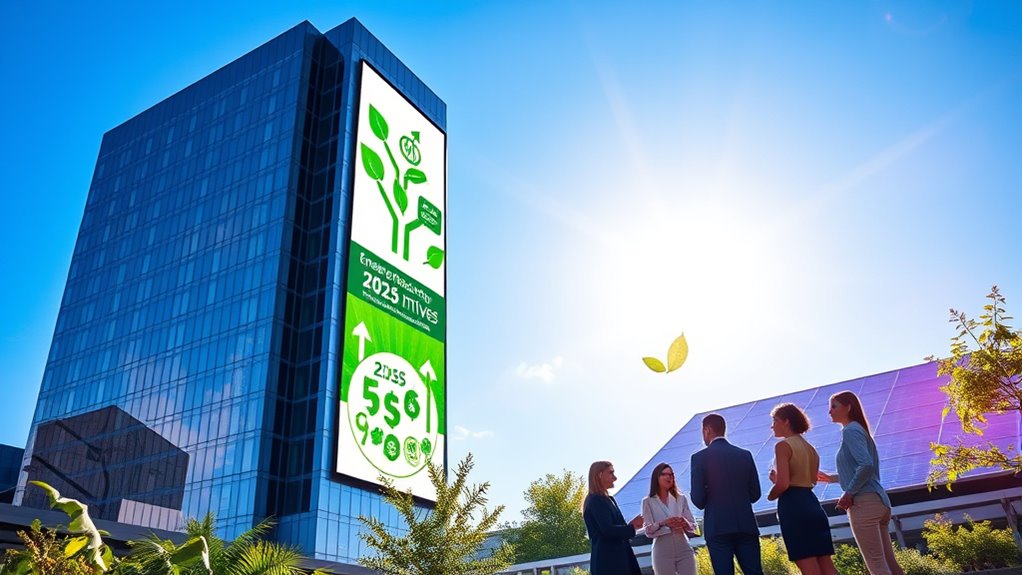In 2025, you can benefit from energy-efficiency tax incentives that help lower your upfront costs and ongoing expenses. These incentives include tax credits and rebates for investing in renewable energy sources like solar panels and wind turbines. Combining grants with tax benefits makes sustainable upgrades more affordable and enhances your company’s eco-friendly reputation. To maximize these opportunities and learn how to apply, keep exploring further details and strategies.
Key Takeaways
- In 2025, businesses can benefit from tax credits and rebates for installing renewable energy systems.
- Combining government grants with tax incentives maximizes overall financial savings on energy projects.
- Tax incentives cover a significant portion of costs for solar panels, wind turbines, and energy-efficient upgrades.
- These incentives reduce tax liabilities, making renewable investments more affordable for small and medium-sized businesses.
- Eligibility often requires documentation of energy plans and demonstrates long-term environmental and cost-saving benefits.

As the push for sustainability accelerates, businesses are increasingly motivated to adopt energy-efficient practices in 2025. One of the most compelling ways to do this is by investing in renewable energy sources. Government grants play a vital role here, making it easier for you to switch to cleaner power. These grants often cover a substantial portion of the upfront costs associated with installing solar panels, wind turbines, or other renewable energy systems. By leveraging these financial incentives, you can reduce your operational expenses over time while aligning with eco-friendly initiatives that enhance your brand reputation.
Invest in renewable energy with government grants to lower costs and boost your eco-friendly brand in 2025.
The availability of government grants helps lower the barriers to adopting renewable energy, especially for small and medium-sized businesses that may lack the capital to make large investments upfront. These grants are designed to encourage sustainable practices, and many programs prioritize projects that demonstrate long-term energy savings and environmental benefits. When you apply for these grants, you’ll find that the application process is straightforward, often requiring documentation of your energy needs and plans for renewable energy integration. Once approved, you can access funds that greatly offset installation costs and sometimes cover maintenance or equipment upgrades.
Beyond grants, adopting renewable energy can qualify you for additional tax incentives, making your transition even more financially attractive. These incentives may include tax credits or rebates that directly reduce your tax liability, effectively lowering the total cost of renewable energy projects. Combining these incentives creates a powerful financial package that promotes quick adoption and long-term savings. For example, installing solar panels with the help of government grants and tax credits can lead to substantial savings on energy bills while also earning you recognition as a sustainable business.
Furthermore, investing in renewable energy isn’t just about immediate financial gains; it’s also about future-proofing your operations. As regulations around carbon emissions tighten and energy costs fluctuate, relying on renewable energy sources offers you greater control over your energy expenses. It also demonstrates your commitment to environmental responsibility, which can attract eco-conscious consumers and clients. In many cases, government grants and incentives are only available for a limited time, so acting promptly guarantees you maximize these benefits before funding opportunities expire.
Frequently Asked Questions
How Do Tax Incentives Vary by Industry for 2025?
You’ll find that tax incentives in 2025 vary by industry due to industry-specific policies and sector-focused benefits. For example, manufacturing gets incentives for upgrading equipment, while commercial real estate benefits from improvements to building energy efficiency. These sector-focused benefits aim to target unique energy challenges and opportunities each industry faces, encouraging you to adopt energy-efficient practices tailored to your sector, ultimately reducing costs and boosting sustainability across different industries.
Are There Specific Eligibility Criteria for Small Businesses?
Imagine your tiny shop fighting for a golden ticket—yes, small business eligibility matters. To qualify, your business must meet specific requirements, like size limits and operational scope. Qualification requirements often include demonstrating energy-efficient upgrades and maintaining proper documentation. If you fit the bill, these incentives could turn your humble enterprise into an energy-saving hero, unleashing benefits that make the effort worth every paperclip and coffee break.
What Documentation Is Required to Claim These Incentives?
You need to gather specific documentation to claim these incentives. Prepare receipts, invoices, and proof of energy-efficient upgrades, including manufacturer certifications if applicable. Keep detailed records of costs and project descriptions to support your claim. Follow the claim procedures outlined by the IRS or relevant tax authority, ensuring all documentation is organized and complete. This way, you streamline the process and maximize your chances of successfully securing the tax incentives.
Can Incentives Be Combined With Other Government Grants?
Yes, you can often combine incentives like solar rebates and energy audits with other government grants. Just make certain you review the specific rules for each program, as some may have restrictions. When claiming these incentives, keep documentation like proof of energy audits, receipts, and rebate approvals. Combining these benefits can maximize your savings, so explore all options and coordinate with grant administrators to stay compliant.
How Will These Incentives Impact Overall Business Tax Liability?
These incentives can considerably lower your overall business tax liability by allowing you to claim credits for renewable energy investments and energy audits. When you upgrade to renewable energy sources or conduct energy audits, you qualify for deductions that directly reduce your taxes owed. As a result, you benefit financially while improving your sustainability efforts. Keep detailed records of these activities to maximize your claims and ensure compliance with current regulations.
Conclusion
By taking advantage of these energy-efficiency tax incentives, you’re not just saving money—you’re building a sustainable future. Picture your business glowing with efficiency, like a well-oiled machine powering ahead through a cleaner, greener landscape. As you invest in smarter solutions, you’re planting seeds for long-term growth and resilience. Embrace these incentives now, and watch your efforts transform into a brighter, more sustainable tomorrow. Your proactive steps today shape a better world for tomorrow.









